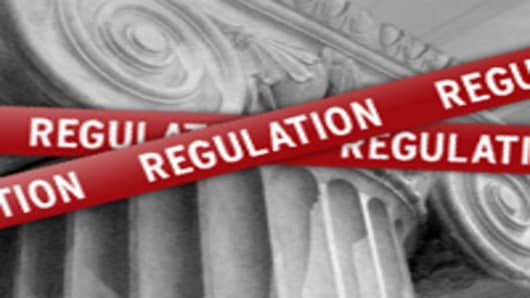A year is a long time in the markets and it seems to have been long enough for global policymakers to forget they promised to work together on financial regulation.
Evidence of a "common hymn sheet" is sometimes hard to find.
In January, markets were shaken by what has been dubbed the Volcker Rule. Former Federal Reserve Chairman Paul Vocker said he didn’t want banks to become "too big to fail."
He threatened to take away banks’ proprietary trading desks and hedge funds. The Volcker Rule still looms as an element in Senate Banking Committee Chairman Christopher Dodd's plans for US banks.
Meanwhile UK regulators have been quietly expressing other ideas. And this week they started shouting.
The UK’s Financial Services Authority (FSA) said that "too big to fail" is a distraction. The regulator’s outspoken Chairman Lord Adair Turner said policymakers must focus on the real causes of the credit crunch and not be distracted by bank break-ups.
He recommends, as does the Bank of England, that “macro-prudential” policies -- ones that counter rather than accentuate the cycle -- should be considered.
UK City Minister Lord Paul Myners hit out at bank margins Thursday, saying that the sector should not be able to sustain a return on equity of over 20 percent.
I'm with Lord Turner. In trying to prevent another credit bubble and subsequent crisis we must focus on what went wrong and try to prevent it from happening again.
There might be parts of Volcker’s plan that go some way towards doing this --consumer protection elements to increase lending oversight -- but the headline bank break-up element seems like a sideshow.
In the UK, the government put billions of taxpayers’ pounds at risk in nationalizing the troubled lender Northern Rock in 2008 because it feared systemic implications. This was not a big bank, but its demise would have had big systemic implications. The moral hazard in this crisis was always about "too interconnected to fail" and not "too big to fail" and Paul Volcker must know this.
This all looks uncoordinated. But to say there is no coordination would be disingenuous as the Basel Committee brings the G20 together on capital standards.
So why are opinion-formers on such different paths? Please could somebody dig the hymn sheet out of the Atlantic so that we can get on with the important task of preventing another credit crisis?
Just because we have seen a jump of more than 45 percent on the Dow since the cycle lows, we have no excuse to sit back and bicker.



